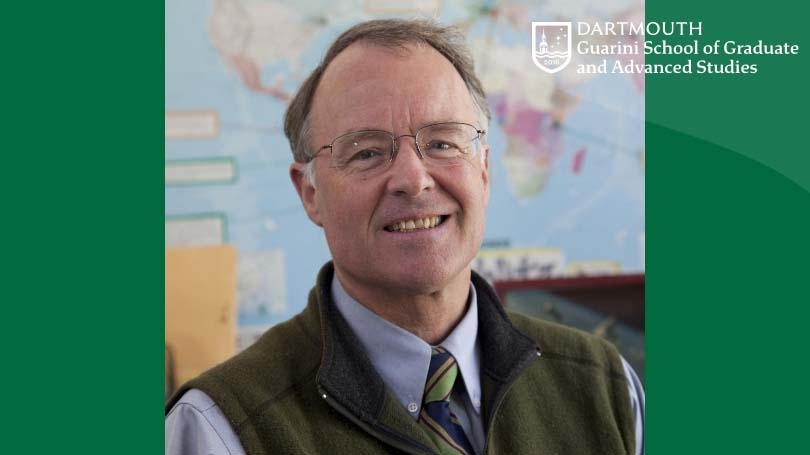When Brian Kunz joined Dartmouth as the Coordinator of Outdoor Education, he didn't expect his role would lead him to writing a thesis for the Master of Arts in Liberal Studies (MALS) program that would be translated into Russian, or that he would be the recipient of the Makarenko Medal in honor of his research on the influential Russian educator. But, thanks to what Kunz says was a series of "magical doors opening, one after another," that is exactly what happened.
Back in 1984, when Kunz started in the Outdoor programs, he took the opportunity to audit a number of undergraduate classes on Soviet History, following a long-held "personal interest in the field" he says. When a group of visiting scholars came to Dartmouth from Russia, he was delighted to be asked to lead them on a series of outdoor events, including the Dartmouth ropes course at Oak Hill.
In 1990, impressed by the integration of robust outdoor programming with more formal academics at Dartmouth, the visitors invited Kunz to travel to Moscow State University to deliver lectures and provide practical lessons in experiential education. This visit included presentations to members of Federal Ministries including the State Committee on Education and the Ministry of Internal Affairs.
Over a period of two months, Kunz gave lectures about the work of the outdoor programs at Dartmouth. It was a time of significant social and political upheaval for the former Soviet Union and, according to Kunz, "It was just magic" to be able to travel the country that had held his interest for so long, and to be met with great hospitality and friendliness.
Propelled by his trip to Russia, Kunz was inspired to deepen his research and enrolled in the MALS program as a part-time student. Over the next few years Kunz participated in successive trips to Russia, including being invited to develop an outdoor component to a STEM camp organized by a professor of biological sciences in Moscow. Combining his work in MALS and his trips to Russia, Kunz became interested in the work of Anton Makarenko an influential pedagogical thinker in the former Soviet Union who integrated outdoor education with childhood development.
Makarenko's efforts to educate the millions of children orphaned during World War I, successive famines, and civil war that swept the former Soviet Union, formed the backbone of Kunz' thesis for MALS, which he submitted in 2000.
"It was a combination of network connections," explains Kunz when asked how his work developed. "The camps were run by a professor of Biology who was a member of that first group of Russian scholars to Dartmouth in 1988. He knew firsthand how powerful the experiences were and wanted to use these methods to inspire young people to embrace the sciences and protect the environment."
Kunz travelled to support the STEM camps over the past thirty years, with help from translators, but for the most part communicating through good will and a mutual desire for learning. He has taught ropes courses at these camps while completing his thesis on Makarenko.
"You'd be surprised how much we managed!" he says, speaking of the language barriers. "Although it was expensive for regular folk to attend, the camp made a determined effort to include kids who might not come from such privileged backgrounds including orphans, to give them the opportunity to learn STEM in this wild, rural outdoor environment."
Kunz completed his last trip to Russia in 2019 and would have worked there in 2020 if not for the pandemic. This year he was informed that his thesis, "Anton Makarenko's Influence on Educational Thought and Practice in the Soviet Union," had been translated into Russian and he had been awarded the Makarenko medal, virtually, from the Makarenko society in Russia.
"Dartmouth is a place where all members of the community can be swept up in the excitement of discovery while learning so much from one another. It is a place where, by working together, we can add to our understanding of this complex world we live in and the untold number of humans who all have something to share that will help overcome our differences."
Kunz retired in 2018 as Deputy Director Emeritus.
